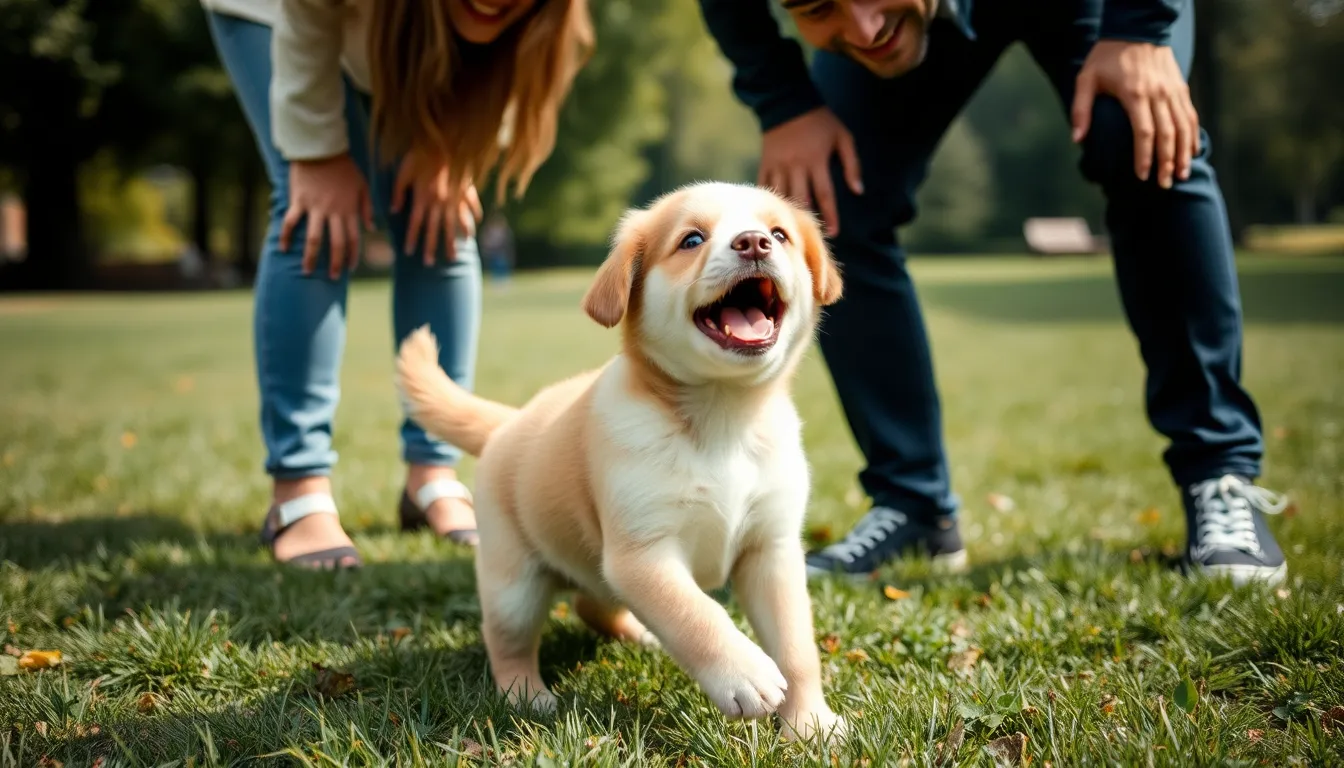Ever noticed your furry friend turning into a little fountain when they see you? It’s not just a quirky habit; it’s a common behavior that leaves many dog owners scratching their heads. Dogs peeing when excited can be both amusing and puzzling, and it raises questions about their emotions and instincts.
Table of Contents
ToggleUnderstanding Canine Behavior
Dogs often urinate when they experience excitement due to emotional responses that trigger this behavior. This reaction occurs across various situations, from greetings to playtime.
The Science Behind Excitement
Excitement leads to increased adrenaline levels in dogs. This hormone stimulates the bladder, resulting in involuntary urination. Stress also plays a role; anxiety can cause similar effects. Understanding the physiological effects of excitement helps owners manage their pets’ behaviors more effectively. For instance, more frequent encounters with new people or environments may heighten this response in young dogs.
Different Types of Excitement
Different events provoke varying levels of excitement in dogs. Playtime with other dogs generates high-energy enthusiasm. Meeting new people can elicit a joyful reaction. Anticipating a walk or a treat also triggers excited urination. Each situation presents unique challenges, especially for young or timid dogs still learning proper behaviors. Recognizing these triggers allows owners to prepare for potential incidents, improving overall training effectiveness.
Reasons for Peeing When Excited

Dogs often urinate when they’re excited due to a blend of biological and psychological factors. Understanding these reasons helps clarify this behavior for many dog owners.
Biological Factors
Hormonal responses play a significant role in a dog’s excitement. Increased adrenaline triggers involuntary bladder contractions. This reaction can lead to accidents during moments of high excitement, such as greetings or playtime. Dogs of all ages, especially puppies, may struggle with bladder control when overwhelmed. Physical maturity affects bladder capacity and control, which can contribute to this behavior. In some cases, breed predispositions may increase the likelihood of excited urination, making this a relevant factor for certain dog owners.
Psychological Factors
Emotional conditioning shapes a dog’s response to various stimuli. Certain situations may create strong associations with excitement and urination, causing dogs to react instinctively. Fear or anxiety, intertwined with excitement, can exacerbate the urge to urinate. Social contexts, such as meeting new people or animals, may overwhelm dogs, increasing the chance of accidental urination. Training plays a vital role, as proper socialization can help dogs manage their emotions more effectively. Addressing these psychological factors can greatly assist owners in mitigating unwanted urination during exciting scenarios.
Managing Excitement-Induced Peeing
Managing excitement-induced peeing in dogs involves a combination of training techniques and environmental adjustments. Owners can significantly reduce this behavior through proactive strategies.
Training Techniques
Training techniques focus on desensitizing dogs to exciting situations. Consistent commands help establish control during moments of heightened emotion. Positive reinforcement encourages calm behavior, rewarding desired actions rather than highlighting the urination. Gradual exposure to exciting stimuli creates a more relaxed response. Practice short, controlled greetings to minimize excitement. For example, reducing enthusiasm during reunions can lower excitement levels. Owners can also train specific cues that signal calmness, reinforcing desired behavior when the dog remains relaxed.
Environmental Adjustments
Environmental adjustments play a critical role in managing excitement-induced urination. Creating a calm space can help reduce stimulation during high-energy events. Designate an area where the dog can retreat if feeling overwhelmed. Social scenarios should include fewer distractions, especially for dogs prone to excitement. For instance, supervise interactions with new people or pets during initial introductions. Removing excess stimuli from the environment helps keep both excitement and stress in check. Additionally, scheduling regular bathroom breaks before exciting activities ensures the dog is less likely to urinate inappropriately.
Understanding why dogs pee when excited can help pet owners manage this behavior more effectively. Recognizing the emotional and biological triggers allows for better training and socialization strategies. By employing techniques to desensitize dogs to excitement and creating a calm environment, owners can significantly reduce instances of involuntary urination.
Fostering a sense of security and encouraging calm interactions not only improves the dog’s behavior but also enhances the bond between pet and owner. With patience and consistent training, it’s possible to navigate this common challenge and ensure a more enjoyable experience for both dogs and their humans.



